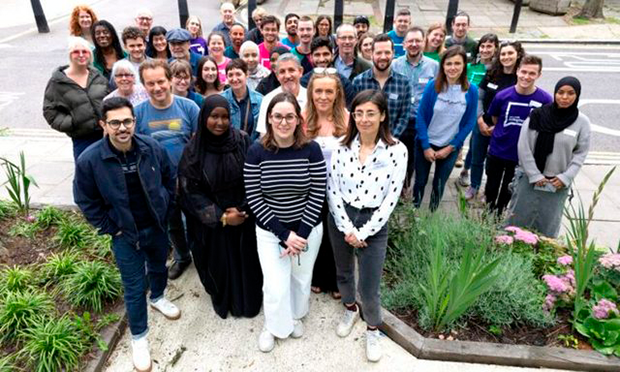Council yet to engage with landlords over climate crisis strategy

A group of panellists outside one of the climate workshops. Photograph: courtesy Islington Council
A council-backed group of Islington locals have agreed a slew of priorities to drive the borough’s approach to the climate crisis.
The Town Hall recently published the work of its ‘climate panel’ – an assembly of 35 residents set up last year to establish ‘guiding principles’ that would help shape the council’s response to climate change.
Hailing the local authority’s “serious” approach, a clutch of panellists gave a candid statement on how taking part had helped ease their “nihilistic” fears about the planet’s future and gave them a renewed sense of hope .
But they added that they wanted their principles to be used “proactively” by the council rather than “just a piece of paper” .
A local primary school teacher, Asmaa, told the Citizen the “whole process was quite insightful”, and highlighted the group’s collective approach.
“We didn’t move forward until most people agreed with the proposals”, she said.
Islington’s environment chief, Cllr Rowena Champion, said she was “so impressed by the panellists’ diligence, dedication and creativity”.
She said urgent action was needed and the council had made “significant progress” to cut carbon emissions, but added: “We’re still at the early stages of our climate adaptation journey.”
The guiding principles, in the panellists’ own words, include protecting public green spaces, promoting sustainable travel, improving economic and social equality, and making the borough’s buildings more sustainable “as much as possible”.
On this point, the Citizen asked the Town Hall how it would ensure both social housing and private landlords stuck to these priorities as set out by the panel.
A council spokesperson said: “So far, interpretation of the principle of increasing resilience and sustainability has not included engagement with landlords – in the panel’s proposals or in our work responding to them.
“We are developing a retrofit handbook, offering guidance for people who want to make climate-focused changes to their home.”
Also in the works is a supplementary planning document to “simplify the planning process for larger retrofit projects in line with the spirit of the principles,” the spokesperson said.
“All the principles will be considered and embedded as the council develops future climate action work.”
The Town Hall added that it was currently focusing on responding to the residents’ ideas and working out which ones can be taken forward and which would need “more resources”.
Islington previously committed to “building a net-zero carbon borough” by 2030.
When seeking residents’ help to define the guiding principles, it asked them to “imagine the borough in 2035”.
On top this, the resident group also came up with several proposals the council could enact to build climate resilience, such as emergency planning for heatwaves.
They also suggested ways to “green the borough”, which included incentivising business to develop greenspace and “collaborating better” with Transport for London and the Canal and River Trust.
Islington’s renewed ‘climate action plan’, set for publication this year, will include panellists’ ideas, the report stated.
The local authority has also created a working group of officers, taken from across different council departments, to develop the ideas into the “climate resilience workstream”.
The climate panel’s 21 guiding principles can be read in full in Islington’s report.
